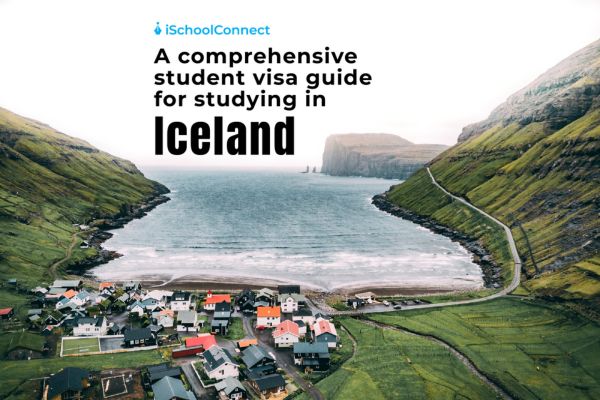Table of Contents
- Why study in Iceland?
- Application process for studying in Iceland
- Application processing time
- Tuition fees and scholarships
- Visa and residence permit requirements
- Required documents
- Financial requirements
- Student registration process
- Health insurance
- Renewal of residence permit
- Post-study options
- Work opportunities
- Accommodation
- Cost of living
- Key takeaways
- FAQs
For international students, to study in Iceland may be an extraordinary and rewarding experience. Iceland, known for its stunning natural beauty, robust education system, and vibrant culture, provides a variety of academic programs and possibilities for students from all over the world. Here’s a thorough guide to studying as an international student in Iceland
Why study in Iceland?
Studying in Iceland offers a unique and enriching experience for international students. Here are some compelling reasons why you might consider studying in this beautiful Nordic country:
Quality education
Icelandic universities are known for providing high-quality education with a strong emphasis on research and innovation. The education system follows international standards and is recognized worldwide.
English-taught programs
Many academic programs, especially at the graduate level, are offered in English. This makes it convenient for international students who may not speak Icelandic.
Safe and welcoming environment
Iceland consistently ranks as one of the safest countries in the world. Its low crime rate and friendly, open-minded population create a welcoming atmosphere for international students.
Natural beauty
Iceland’s breathtaking landscapes include glaciers, waterfalls, volcanoes, geysers, and hot springs. Studying here offers opportunities to explore these natural wonders and engage in outdoor activities.
Unique culture and heritage
Icelandic culture is rich in history, folklore, and traditions. Students can immerse themselves in the country’s artistic, literary, and musical heritage.
Small class sizes
Universities in Iceland often have smaller class sizes, allowing for more personalized attention from professors and fostering a strong student-teacher relationship.
Research opportunities
Iceland is a hub for research, particularly in fields like renewable energy, environmental studies, and marine biology. Students have access to cutting-edge research facilities and projects.
International community
Studying in Iceland means being part of a diverse international student community. This provides opportunities to make friends from around the world and experience various cultures.
Sustainability and Green energy
Iceland is a leader in renewable energy sources such as geothermal and hydroelectric power. Studying in Iceland aligns with a commitment to environmental sustainability.
Northern lights and midnight Sun

Experience the stunning phenomenon of the Northern Lights (Aurora Borealis) during the winter months and the Midnight Sun during the summer.
Multidisciplinary learning
Many Icelandic universities emphasize interdisciplinary learning, encouraging students to explore various fields of study.
Vibrant cultural scene
Reykjavik, Iceland’s capital, is known for its lively arts and music scene, with numerous cultural events and festivals throughout the year.
Application process for studying in Iceland
Choose a Program: Research universities and programs to find the one that best suits your academic and personal goals.
- Check the admission requirements for your chosen program, including academic qualifications, language proficiency, and any additional documents.
- Be aware of application deadlines, which may vary depending on the program and university.
Application processing time
- Visa and residence permit processing times vary. Apply well in advance to ensure you have enough time to receive your documents before your intended travel date.
Tuition fees and scholarships
- Tuition fees in Iceland vary depending on the program and level of study. Check the university’s official website for specific details.
- Some universities and institutions offer scholarships for international students. Research available scholarship opportunities and their eligibility criteria.
Visa and residence permit requirements
- Citizens of the European Union (EU), European Economic Area (EEA), and European Free Trade Association (EFTA) countries do not need a visa or residence permit to study in Iceland. However, they must register their legal residence if they plan to stay for more than three months.
- Non-EU/EEA/EFTA citizens typically need a student visa and residence permit to study in Iceland.
Required documents
While the specific documents may vary depending on your country of origin and the consulate’s requirements, common documents include:
- Completed visa application form
- Acceptance letter from an Icelandic educational institution
- Valid passport
- Proof of sufficient funds to cover living expenses
- Health insurance coverage
- Passport-size photographs
- Documentation of accommodation arrangements
Financial requirements
You must provide proof that you have enough funds to cover your living expenses during your studies in Iceland. The exact amount required may vary, so check with the consulate for the latest information.
Student registration process
After arriving in Iceland, you must register your legal residence with the Directorate of Immigration within the first week of your arrival. This applies to both EU/EEA citizens and non-EU/EEA citizens staying for more than three months.
Health insurance
Health insurance is a mandatory requirement for obtaining a student visa and residence permit. Make sure you have comprehensive health insurance that covers medical expenses during your stay in Iceland.
Renewal of residence permit
If your study program in Iceland extends beyond the duration of your initial residence permit, you must apply for a renewal before your current permit expires.
Post-study options

After completing your studies, you may be eligible for a post-study residence permit that allows you to stay and work in Iceland for a specified period to gain work experience related to your field of study.
Work opportunities
- Non-EU/EEA students are allowed to work up to 20 hours per week during the academic year and full-time during holidays.
- Job opportunities might include part-time positions, internships, or research assistant roles.
Accommodation
Universities often provide assistance in finding accommodation for international students, either on-campus or in student housing.You can also explore private rental options or shared housing.
Cost of living
The cost of living in Iceland can be relatively high. It’s essential to budget for expenses like housing, food, transportation, and leisure activities.
Key takeaways
- Studying in Iceland provides not only an excellent education but also a chance to explore a unique natural environment, engage with a diverse community, and embrace a culture that’s rich in history and innovation.
- Apply for a student visa early in advance to ensure that you have enough time to obtain your documents prior to the departure date you have selected.
- Within the first week of your arrival in Iceland, you must register your legal residence with the Directorate of Immigration.
- It’s important to note that immigration regulations can change, so always refer to the official website of the Icelandic Directorate of Immigration or the Icelandic embassy/consulate in your country for the most up-to-date and accurate information regarding student visas and residence permits for studying in Iceland.
We hope you found this blog informative and helpful in your pursuit of studying in Iceland. If you have any thoughts or comments, please share them below. For further information and assistance with your queries related to studying abroad, click here to contact us. We are happy to assist you!
Liked this blog? Read next: Vienna University of Economics and Business | A complete guide!
FAQs
Q1. Are there scholarships available for international students?
Ans. Yes, there are scholarships available for international students to study in Iceland. Some scholarships are offered by the Icelandic government, while others are provided by individual universities or external organizations. It’s a good idea to research and apply for scholarships early.
Q2. Can I work while studying in Iceland?
Ans. Yes, most international students can work part-time while studying in Iceland. However, you may be limited in the number of hours you can work, especially during the school year. It is necessary to thoroughly understand the legislation governing student work permits.
Q3. What’s the weather like in Iceland?
Ans. Iceland has a cool, temperate maritime climate. Winters are relatively mild due to the North Atlantic Current, but they can still be quite cold, especially in the northern parts. Summers are cool and pleasant, with long daylight hours.






